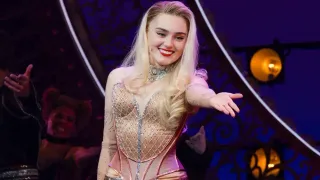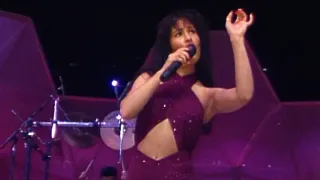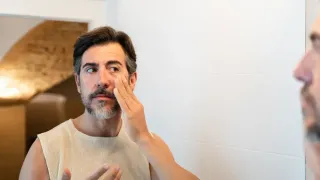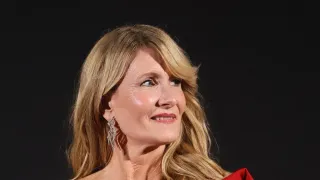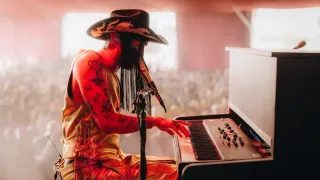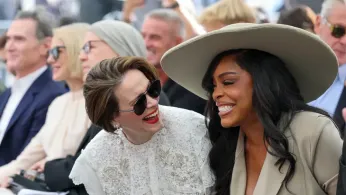
5 hours ago
Beyond the Brief: Sarah Paulson and Niecy Nash-Betts Bring Queer Depth and Delight to "All’s Fair"
READ TIME: 3 MIN.
It takes a certain kind of boldness to make a legal drama feel fresh in 2025. Enter "All’s Fair"—the latest from Ryan Murphy, whose penchant for high drama and queer storytelling has always been hard to resist. But this isn’t just another courtroom procedural. Starring Sarah Paulson and Niecy Nash-Betts, alongside Kim Kardashian, Naomi Watts, Teyana Taylor, and Glenn Close, "All’s Fair" is as much about the power of queer camaraderie as it is about divorce law—on screen and off .
The real star power here isn’t just the stacked cast—it’s the chemistry between Paulson and Nash-Betts. Their friendship, forged through years of collaborating and supporting each other, radiates in interviews and shines through their characters’ dynamic. In a recent sit-down, the duo laughed about everything from their “lesbianing” skills (“I’m great at being a lesbian on screen, but Sarah, you’re the pro,” Nash-Betts teased) to their mutual obsession with queer cult classic"Carol" .
Their banter isn’t just charming—it’s refreshing to see two openly queer women in Hollywood talk about queer pop culture touchstones and the hilarity of learning to “act gay” for the camera. “I feel like every lesbian on TV owes something to Cate Blanchett’s gloves,” Paulson quipped, sending Nash-Betts into a fit of laughter .
What makes "All’s Fair" resonate with LGBTQ+ audiences is its refusal to flatten queer women into stereotypes. Paulson’s Carrington Lane is all sharp edges and vulnerability; Nash-Betts’ Emerald Greene is the show’s emotional anchor. Both characters are fully realized women: successful, flawed, and—most importantly—queer, without apology or explanation .
The series doesn’t shy away from the realities of being out in high-powered spaces, but it also luxuriates in queer joy—messy brunches, office crushes, and the small moments of solidarity that LGBTQ+ people know so well. For Nash-Betts, who has spoken candidly about her own journey into public queerness, the show is “a love letter to all the queer women who know how to hold each other up, even when the world tries to knock them down” .
For many, the promise of "All’s Fair" lies in its unapologetic centering of powerful women—especially queer women of color and their allies. Nash-Betts, who made headlines when she married her wife Jessica Betts in 2020, brings an authenticity to Emerald that is rare on mainstream TV. “Emerald is who she is, and she makes no apologies. That’s what I want for every Black queer woman watching: to see themselves as worthy of love, success, and friendship,” Nash-Betts shared in a recent panel .
Paulson, too, has long been a touchstone for LGBTQ+ audiences, never shying away from playing messy, complicated queer characters. Their off-screen friendship is, in many ways, a microcosm of the community’s best qualities: humor, resilience, and an unshakeable sense of belonging.
Ryan Murphy’s TV universe has always been unapologetically queer, but "All’s Fair" feels like a culmination. Here, queerness is woven into the fabric of every scene, not an afterthought or a “very special episode.” With Nash-Betts, Paulson, and a supporting cast that includes Teyana Taylor and trans actress Hari Nef, the series is a testament to the richness of LGBTQ+ storytelling on the small screen .
Critics may have mixed feelings about certain cast choices or the show’s melodramatic pivots (“Kim Kardashian: legal eagle?” isn’t for everyone), but there’s no denying the impact: the premiere became Hulu’s most-watched scripted debut in three years .
What ultimately sets "All’s Fair" apart is its emotional resonance. For viewers who grew up searching for scraps of representation, seeing a legal drama where queer women are front and center—laughing, fighting, loving—feels like a revelation. The show’s message is clear: queer women don’t just survive; they thrive, lead, and rewrite the rules.
As Nash-Betts told Out: “We’re not just here to be sidekicks or the comic relief. We’re here to be the story. And that, honey, is the real win” .
The impact of "All’s Fair" is felt not just in front of the camera, but behind it. Both Paulson and Nash-Betts serve as executive producers, shaping the series’ creative direction and ensuring nuanced, authentic storytelling . Their leadership is a new standard for queer women in Hollywood: not only visible, but powerful and in charge of their own narratives.
"All’s Fair" isn’t perfect—no show with this much ambition ever is. But for LGBTQ+ audiences hungry for stories that reflect their realities and dreams, it offers something rare: a glimpse of queer women as leaders, lovers, and, above all, friends.
The verdict? It’s not just “fair”—it’s fabulous.

